|

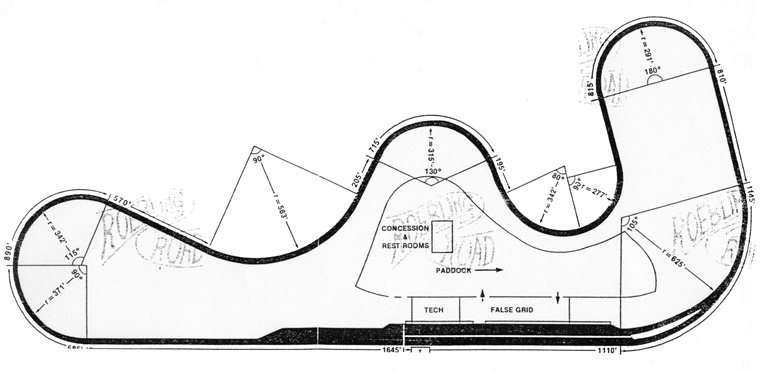
"Vee have vays
of making you talk!"
Sunday,
January 8th
You can look at our
Daytona Practice in one of two ways. 1)
We blew a ton of money, got very little track time,
and ran into lots of problems, so it was a waste of
time and energy. Or, 2) We blew a ton of
money, persevered through many hardships, and now we
know where we need to improve.
Regardless of your
point of view, both sides agree, we blew a ton of
money! Danny
and I slowly came around to point of view #2.
I think I had a little more time to think about it,
because the drive back home from Daytona was 8
hours, while Danny's flight was only 3.
At the beginning of my ride home, I was somewhat sour
on the whole experience. My wife wasn't very happy sitting next to me,
listening to me grouse, but she was a good sport.
8 hours later, by the time I pulled in the driveway,
I had come around to thinking about how we were
going to make things work more smoothly.
So Sunday morning, I'm
on the phone with Danny, and we started plotting our
new strategy. Danny didn't have quite as
much downtime on his trip home to think about it, so
he wasn't quite in the same state of mind that I
was. So to get the ball rolling, I put
together a "punch list" of things we needed to be
successful and emailed it to Danny.
While Doc is a
brilliant car builder and Lenworth is an excellent
mechanic, we got the message loud and clear that we
needed our own tools, our own pit crew, etc.
Sharing resources wasn't going to work as smoothly as everyone first
envisioned. And Doc just couldn't do it all by
himself. So at the top of the list was that we
needed a crew chief - someone that could take things
off Doc's plate so he could concentrate on making
the car better and faster. We also
needed our own pit crew. And we needed
our own set of tools. At Daytona, when the NRG
/ ROAR team cars went out for practice, their
mechanics took the only tool chest with them to the
pits (I don't blame them - they had 3 cars to
support). But this meant that when Danny and
Bill and I were thrashing on the car back in the
paddock, trying to get it ready, we didn't have much
more than a screwdriver and a hammer. So
one of the important things was that our 4 car ROAR
team needed a second set of tools. Plus we needed more
practice in the car. We clearly didn't get
enough seat time at Daytona to become comfortable
with the car. Danny was convinced it was down
on power as compared to the other RX-8's. I
wasn't sure either way.
So a plan developed:
1) Find a Crew
Chief 2)
Find some pit crew
3) Identify what
tools, etc, ("hardstuff") we are missing, and get it
4) Get some more
seat time in the car before Daytona
And Danny came up with
one of his own.
5) More power!
Friday,
January 13th
Danny is incredibly
resourceful, and once he has a plan of action, you
pretty much get out of his way, or you'll slow him
down. He's one of those guys that rolls up his
sleeves and gets things done while everyone else is
still scratching their heads. Just the kind of
guy you want on our side in Iraq, Afghanistan,
Somalia, Lebanon, etc (and he's been to all those
places, on behalf of you and me, when he was a
Special Forces / Army Ranger).
So Danny talked to
Jon Lewis, owner of German Speed Merchants, in
Wilmington North Carolina. Jon was very
enthusiastic about being our Crew Chief, and one
better, he could even provide some pit crew. Not
only that, Jon happened to be renting Roebling Road
Raceway a few days before the Daytona race, as kind
of a private test day for his customers. Can
you say,
Kismet? I
need to tell you some more about Jon and his crew.
Danny, Brandon Mee (one of Jon's mechanics) and I
co-drove the "old yellar" Jetta that Jon built and
owns, in the SCCA Kumho Tires 13 Hour Charge
of the Headlight Brigade enduro, held at VIR back in
October. Jon was Crew Chief, and he
brought along about 10 of his employees to take care
of the car. These guys were some of the
most enthusiastic and capable crew that I have ever
seen. And Jon did an excellent job of
orchestrating the whole affair. Here is an
example: Flashback -
October, 2005
Its 3:00pm, about midway
through the 13 hour enduro. We did a
driver change around 2:00, so I've been driving "old
yellar" for about an hour. It's sunny and 80
degrees, and by this time my driver's suit is
saturated with sweat, but I don't notice, as I'm
having so much fun. I'm in a "groove" with the
car, lapping VIR in the 2:26 to 2:28 range depending
on traffic -
a nice comfortable "endurance" laptime for an ITB
car on endurance race tires. Suddenly,
at the top of the uphill esses (the right hander
which is the fastest turn on the course no less),
the steering goes all wobbly! I lift off the
accelerator and just barely manage to keep the car
on track as I negotiate the turn. I still
haven't bled off enough speed, so approaching the
next turn (turn 10, nick-named "Stevie Wonder"
because its blind and fast), my foot gropes for the
brakes, and oh-my-god, I don't have any of those
either! I pump furiously at the pedal
and manage to get just enough braking power to slow
the car. With cars whizzing by, I nurse
"old yellar" back to the pits, while yelling
frantically on the radio back to Jon, "I'm coming in
- we're hurt bad - the steering's broke, the brakes
are broke!" In my mind, the car is mortally
wounded and the race is over.
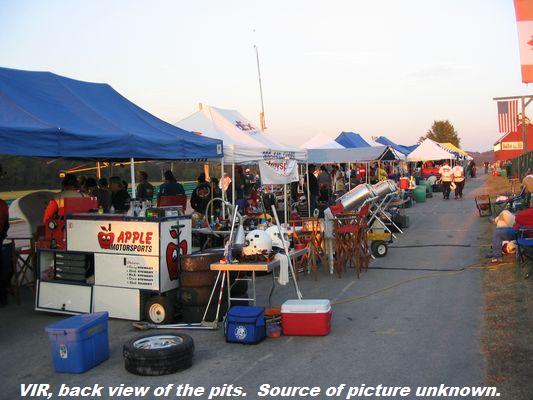
But not to Jon and his
crew. Back in the paddock the GSM mechanics
swarm over the car. The left front axle had
broken, and fortunately the wheel was being held in
place by the brake caliper, or it would have fallen
off completely. They jack it up and three
guys immediately set to work replacing the axle.
Meanwhile Jon
diagnoses the brake failure as a ruptured seal,
where the brake line ties into the cockpit brake
bias adjustment bar. The pressure must have
somehow spiked when the axle failed and I first went
for the brakes. So he simultaneously sets to
work, fabricating a bypass to the brake bias bar.
Within 20 minutes, the axle is changed, the brakes
are fixed, the tires are changed, the car is
refueled. We get the car quickly inspected by
the SCCA tech officials, and they send me back on
track. Whoa baby! I feel like I'm
driving the 24 hours of Lemans, the year is 1952, my
pit crew has just saved the day...
Return to Present - Sunday, January 22nd
Beth and I and "Shadow
the wonder dog" pack up and head south to Savannah,
or more accurately, to Pooler GA, which is a sleepy
little suburb of Savannah, and the closest "major"
town to Roebling Road. Somewhere in
South Carolina, 3 cars blow by us on I-95 doing
maybe 100mph - a dark blue BMW M3 and a souped up VW
Golf, affixed like a remora to the rear bumper of an
aqua colored late model BMW M3. I think for a
moment before I realize, "those HAVE TO BE some
German Speed Merchant guys heading down to
Roebling." Now since I started racing, I drive
quite prudently on the highway - in fact I'm often
accused of driving like an old man, but this is too
good to pass up. Having no idea how fast a
Ford Explorer will go, I take off in pursuit, and
within a mile or so I'm along side the lead BMW.
I wave, but there is no recognition by the other
driver (heck, those guys have only met me once
before), so I drop back to normal speed and let them
go.
On a damp but warm
day (62 degrees, 100% humidity), we arrive at the
Jameson Inn around 2:30pm. Doc and Lenworth
arrive shortly thereafter in a big F350 pickup
towing an open trailer with the car. The back
of Doc's pickup is full of tools, and a fresh set of
Hoosier racing tires mounted on the expensive,
lightweight rims that Doc prefers. I was
surprised and a little puzzled by this - I thought
Doc had a big transporter to haul the car around
with. But Doc explains that the car will be
hauled to the races on the ROAR Racing transporter -
the nice shiny new one that you saw pictures of in
the Daytona Practice story. That behemoth can
hold 4 cars - the 3 NRG ROAR cars, and Doc's ROAR
car. That sounds like a pretty good long
term plan to me.
Doc and Lenworth and
I caravan over to the track, so we can leave his
truck and the car there. Even though the
Jameson Inn is quite nice, our gear will be much
safer locked inside the track than it would be in
the hotel parking lot. When we get
there, we find that a Formula Mazda racing team is
on track. Just two cars - they look like
little Indy racers, and they buzz around the damp 2
mile track about every 80 seconds or so, kicking up
rooster tails of spray as the go.
Surprisingly, the track officials don't even stop
the test session to let us cross the track - they
just had us wait until the cars passed by, and then
we dashed across the track into the infield with the
truck and trailer in tow. That was when
I got yelled at for the first time, by the track
officials. Apparently I wasn't moving fast
enough to suit their taste. I ALWAYS get
yelled at, at least once, when I go to Roebling Road
- its just one of those things I can count on.
Its an SCCA owned track, which means it might as
well be owned and managed by the East Germans at the
height of the cold war ("Vee
have vays of making you talk!").
We drop off the truck
and trailer, and Doc and Lenworth climb into my car.
I get yelled at once more (that's twice now) as we
get motioned back across the "live" track.
What a spectacular crash that would be - a Formula
Mazda disintegrating at 130mph into the side of a
Ford Explorer.
We agreed the new
team would get together in the Hotel conference room
at 6:00pm - basically a chance for our Crew Chief
and his crew to meet Doc and Lenworth. Over a
casual pizza dinner we discussed plans for the
season, but we didn't go into too much detail.
Mostly is was just a meeting of the minds on what
everyone's role would be. The good news is that
it looks like Jon will be able to travel to most of
the races with us, maybe only missing one or two.
It looks like the core team members will be:
Donald "Doc" Holness -
Team owner, chief engineer
Jon Lewis - Crew Chief
Lenworth Barnett - Chief
mechanic
Sripathi (Sri) Haputantri - Crew / Mechanic (We just
call him "Sree")
Aaron Barlow - Crew /
Mechanic Scott
Pullard - Crew / Mechanic
Victor Manning - Timing
& Scoring Danny
Alvis - 1st Driver Extraordinaire
Mark O'Dell - 2nd Driver
Extraordinaire
Also at the meeting was Randy Shields, who is a good
friend and sponsor of Jon's "old yellar".
Randy is a super nice guy, and may be helping us out
here and there as well, depending on our needs and
his availability.
Once we got done with
the serious business, we horsed around for an hour
or so, drinking beer, discussing the best way to
drive Roebling Road, and watching some on-track
racing video that I had stashed on my laptop.
I made sure I asked Victor (a BMW M3 driver) about our
encounter on the interstate earlier in the day.
"Oh that was you?" Victor replied. "I just
thought it was another one of those nutty SUV
drivers." Right on both counts. By this
time Doc was worn out - he was starting to nod off
from exhaustion - he got almost no sleep the night
before. It was time to call it a night.
Monday, January 22nd
8:00am found us at a
drizzly racetrack, unloading the car and tools into
the covered "tech shed". No one else
snagged it, so what the heck, we wanted to be dry.
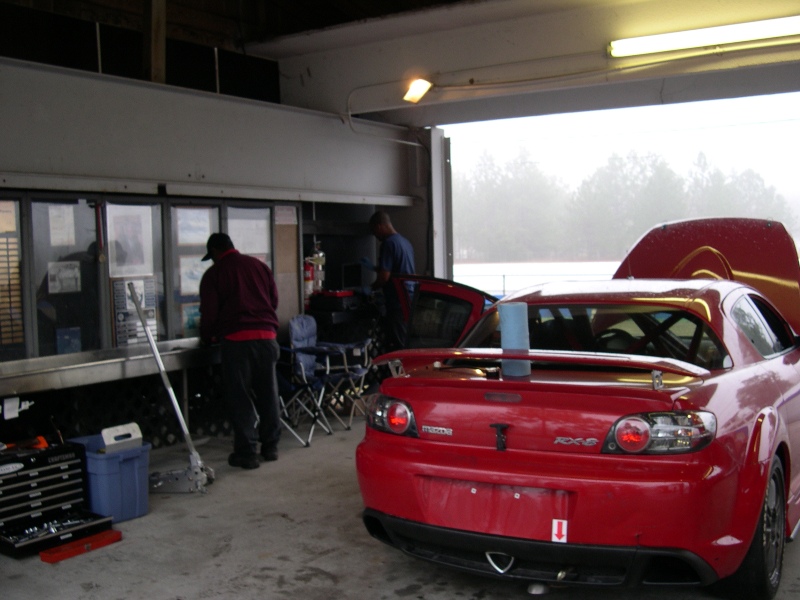
Everybody else figured
out pretty quickly that was the place to be,
so all of a sudden the tech garage was crammed with
cars. Notice the RX-8 has no decals on
it any more. Doc felt he needed to make the
car look more professional, so he and Lenworth
stripped off our makeshift numbers. Doc has
arranged for a professional sign guy to come by his
shop tomorrow to put some nice graphics on the car.
So you'll see the car with a new look when it
debut's at the Daytona Race in a couple of days.
There were only 11 other
drivers sharing the track that day, some were
employees of German Speed Merchants, some were
customers. Jon held a drivers meeting and
explained to everyone how the 2 alternating run
groups would be organized. Our run group would
include the more experienced drivers, and passing
would be allowed anywhere, when signaled by the car
in front. Not quite a racing group (where
passing is allowed anywhere with or without a
signal), but it's the next best thing and it makes
the event MUCH safer. After all, we
don't need to bang up the car 3 days before its
first race.
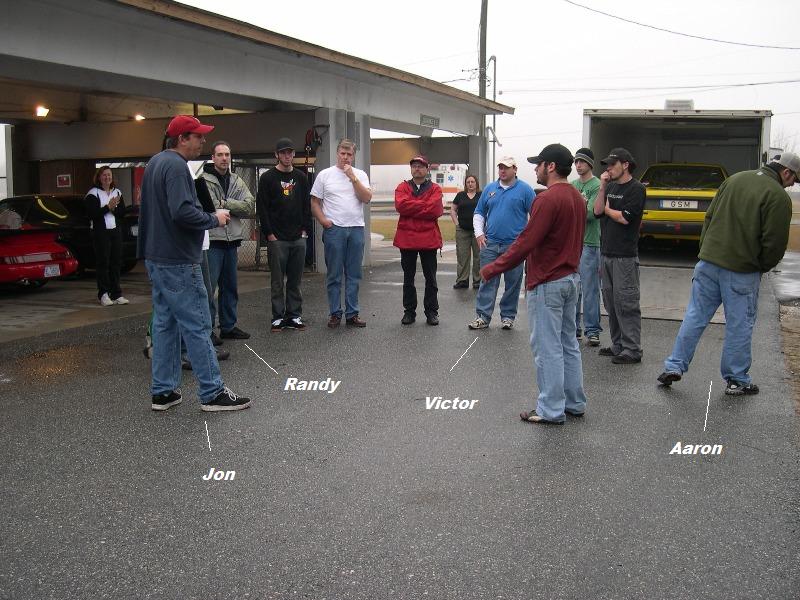
The RX-8 had very little
fuel, so I grabbed an empty gas can, and hopped in
the Explorer for a quick drive to the local gas
station. The RX-8 was tuned to run on 100
octane Race Gas, but the pumps at Roebling weren't
open yet, so in a pinch we can run on regular pump
gas if we have to. I get admonished a third
time (not exactly a full blown yelling, so we'll
only count that one as 1/2 yell) as I re-enter the
track. I arrived just moments before 9:00am,
when the officials close the gate, signaling the
start of the event. With this many cars
on track (5-6 per session), there would be no
crossing of a "hot" track.
Roebling in the rain
(although it was really only sprinkling) on worn
Hoosier racing "slicks" is something everyone should
experience at least once. For this
practice we were using the leftover tires from our
Daytona test days, and while they had a decent
amount of rubber on them, they aren't grooved at all
- nada - nothing. The first 20 minute
session was pretty uneventful, but I felt like a
pro-rally driver trying to keep the RX-8 on-track.
One of the things we learned was that the car felt
great under full throttle, but at 50% or less
throttle the engine was stumbling badly. This
made it really hard to keep the car balanced in a
sweeping turn, a phenomena that was exaggerated by
our slower speeds in the rain. Its
important for the car to behave well under partial
throttle, because the way you maintain the car's
speed in many long turns is to stay gently on the
throttle. So Doc had a little more work to do
with his custom engine management computer.
Doc wanted me to give him feedback on how the car
was handling, but I told him I still didn't have
enough time in the car to do that. You
can end up chasing your tail trying to make the car
faster, if you make snap judgments, because for
every change you make there are three possible
outcomes. 1)
The car goes faster
2) The car goes
slower 3)
The car is neither faster nor slower, just different
I seem to have an awful
lot of experience with #2 and #3 (especially 2), so
I elect to hold off until I get more seat time with
the car. Plus, until you are able to drive the
car consistently well, and under identical
conditions, you don't know if the change made the
car handle better or worse.
The track sessions are
short, so we are rotating on track every 20 minutes.
This is actually an ideal test situation, since this
allows you just enough time in the car to figure out
what it's doing, then a quick break to make any
adjustments. Doc spends this down time
with his computer plugged into the car,
reprogramming the air-to-fuel ratio, trying to make
it perform better in part throttle applications.
When a session starts, I'll go out for a few
laps, then I'll pop back into the pits to tell him
how the engine is responding, so he can quickly
reprogram the computer. Being a short
track, laps go quickly at Roebling, so we can
actually repeat this 2-3 times in a 20 minute
session.
During the still wet
second session, I was doing my best impression of a
dirt-tracking / rally driver, getting the car out to
some rather imprudent slip angles, shall we say.
If you were following along behind, you would have
gotten more than an occasional view of my doors
handles. Heck, its fun to drive that way, and
it helps you practice your car control, but it
doesn't necessarily make for the fastest time around
the course. In the middle of turn three, my
enthusiasm got the best of me, and I quickly found
myself facing the wrong way, the car in a lurid
slide into the sandy wet grass on the left. In
the blink of an eye, as I'm sliding backwards toward
oblivion, my first thought was "dang, Danny's going
to kill me if I put this thing into a tire wall 3
days before our first race".
Now It is a well
known fact that a race car will not slow down once
it hits wet grass - some folks claim that it
actually speeds up! For all the
control I had at that point, I might as well have
been sitting in the passenger seat (if the car had
one), so all I could do was put "both feet in" (lock
up the brakes, press in the clutch to save the
motor) and hang on tight! In an inexplicable
twist of fate, the car stopped almost immediately,
avoiding the foot-deep standing water 20 feet to the
left of the track, as well as the dirt burm the SCCA
wisely erected to keep you out of the trees.
I got the car quickly back on track, but then the
engine IMMEDIATELY started to buck like a bronco.
Oh, no, I broke the car! I may not have been
fast enough pushing in the clutch - and a car
sliding backwards can potentially brake the motor
due to the stress on it, since running motors don't
like going backwards! So I nurse it to the
pits, Doc leans in, presses some buttons on the AiM
dash and proudly declares - "you're out of gas!"
Whew!!!!!!!!!
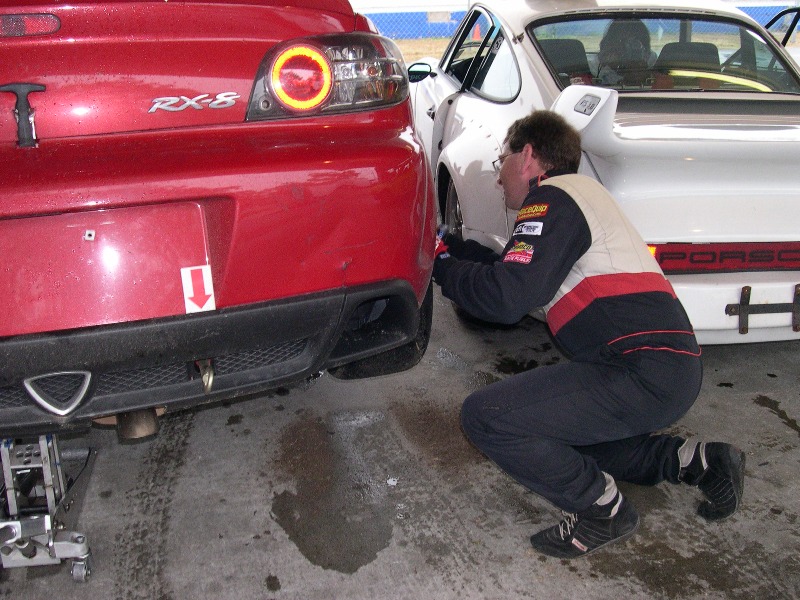
I find out later that
while all this was happening, since you can see turn
3 from the pits, most everyone standing there was
immediately concerned for my safety. But
Doc and Lenworth knew better, so they're laughing their
@sses off! Back in the shed, as I'm cleaning
sand out of the wheels, I am hounded mercilessly -
Lenworth laments that its too bad the video camera
wasn't mounted, so I resolve to get it in the car
before the next session.
A
Lap with Mark on a drying Roebling track <<Link
I think I look like
I'm driving drunk when I watch this video. The
car is cutting out under light throttle, and the
track is still a little damp, so basically any
"smoothness" went out the window. Mostly I was
just trying to stay on track. Fortunately as the track slowly
dries out, each session the car gets faster and
faster. However this makes for a difficult test situation,
because if you make a change to the car, you don't
know if you are faster because of the change, or
maybe you are faster because the track conditions
have improved. So we hold off on
adjusting the car's suspension, and Doc
continues to make minor adjustments to the computer
to improve the engine's drive-ability under part
throttle conditions.
Roebling is a good
place for testing that - several of the turns are constant
radius, so you are under partial throttle quite a
bit. Even if we don't get it fully resolved,
we are hoping Daytona shouldn't pose quite as big a
problem in that regard.
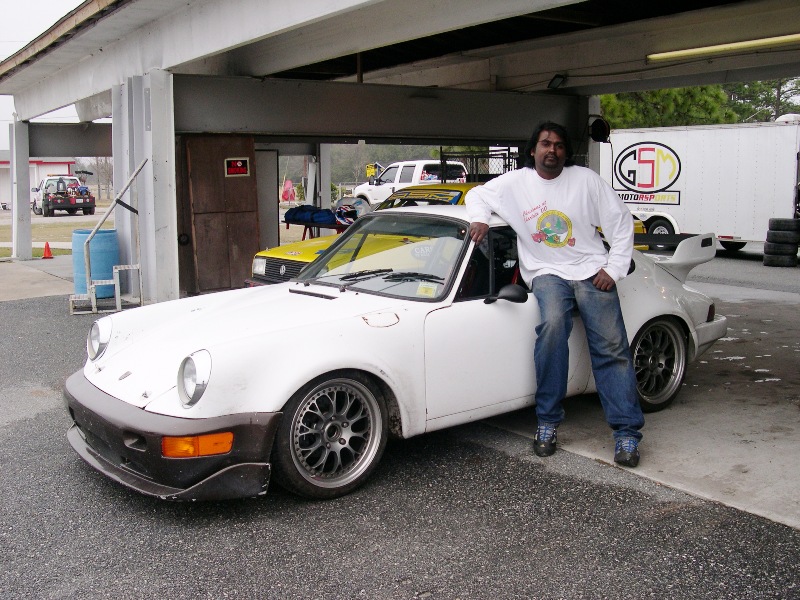
Sri (pronounced "Sree")
posing next to his 70's era Porsche 911. Sri
resurrected this car from the dead, rebuilding it a
piece at a time from hodge-podge parts as he came
across them. The body panels don't match, but
it sure seemed cleanly built, well put together, and
very fast. He's clearly an extremely
knowledgeable mechanic, that will be a great asset
to our team.
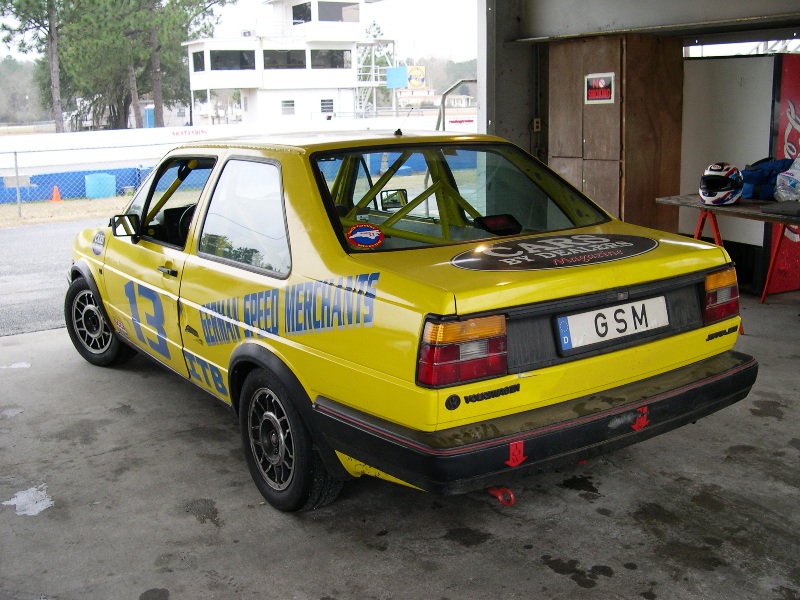
Old Yellar, sporting
Randy Shields' "Cars by Dealers Magazine"
sponsorship decals. Randy -- a few of these
decals might look good on our RX-8 (hint, hint,
wink, wink).
Jon told me that after our 13
hour endurance race, they got the car back to the
shop, and the GSM guys did an extensive inspection.
I had told Jon that late in the race, I noticed Old
Yellar's steering starting to shake quite a bit under
braking. Jon laughed and said its no wonder -
apparently the abuse of the race had taken a toll -
we had broken a front subframe bolt, and lost
another one. Plus we finished the race with no
brake pads left on a couple of the wheels.
I'm glad I didn't know that when I was driving the
last stint...
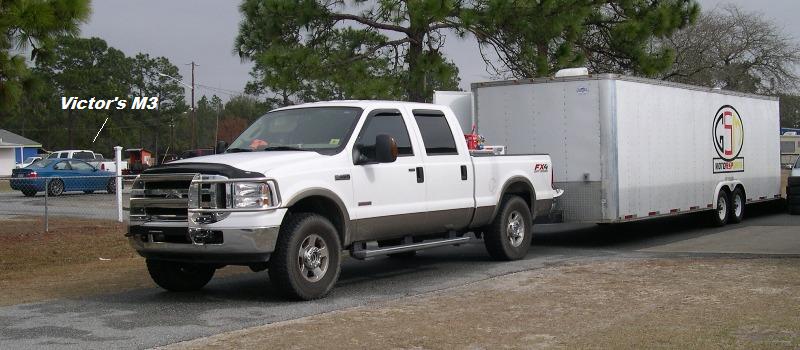
Jon's GSM race car
hauler. In the background you see Victor's low
flying M3 street car. Mr. policeman, if you
see Victor hauling @ss down I-95 this Thursday
night, please look the other way - he's coming to
Daytona to do timing and scoring for our race...
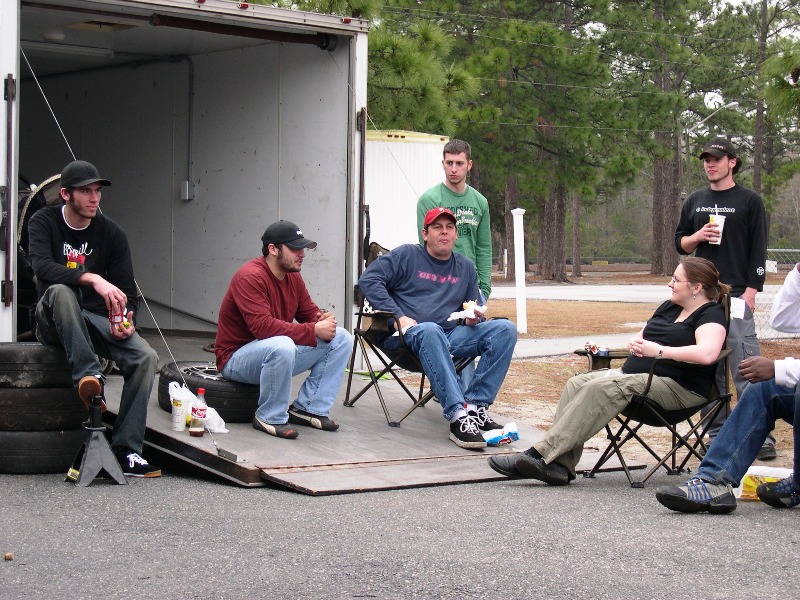
Lunch was downtime
for the most of the gang - a chance to take a break
and relax. But not for yours truly - no siree.
I moseyed over to the track office, and asked the
one person I could find, if I might be allowed to go
out on track and sweep off some of the mud and dirt
that had accumulated in a few of the corners.
It seems that I wasn't the only one with an
occasional off track excursion, and some of the dirt
dragged back on track would interfere with our being able to lay down some good
laps. So with permission, I threw a push
broom in the back of the Explorer, and set off on
the empty track. Shoot, this is harder
work than I thought - after about 10 minutes I only
managed to sweep a small part of turn #1. I
skipped the dirt that was down in Turn 2, as it
wasn't on the racing line anyway, and proceeded to
the site of my infamous turn 3 debacle.
Huffing and puffing away, I made a small dent in it,
only to pause and look up into the puzzled face of
two track workers in a pickup truck. "Don't
you know you're not supposed to be out here..."
You know how it went. Actually, this was
a pretty good tongue lashing - these guys were on a
roll - so I may count it as two. It
certainly more than made up for the half-hearted one
I got when I arrived almost late while fetching gas
this morning. Lets see, 1 + 1+ 1/2 + 2 = 4 1/2
stern rebukes in less than 24 hours. I think
that's a new Roebling Road track record, probably
the only one I'll set today!
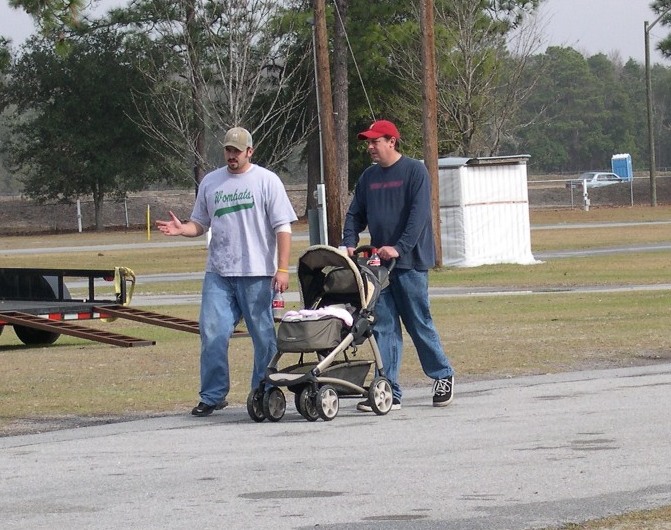
Clearly Jon has a pretty
good perspective on where racing fits in with his
business and his family. Whenever
possible, he brings along his wife and daughter
Lagan.
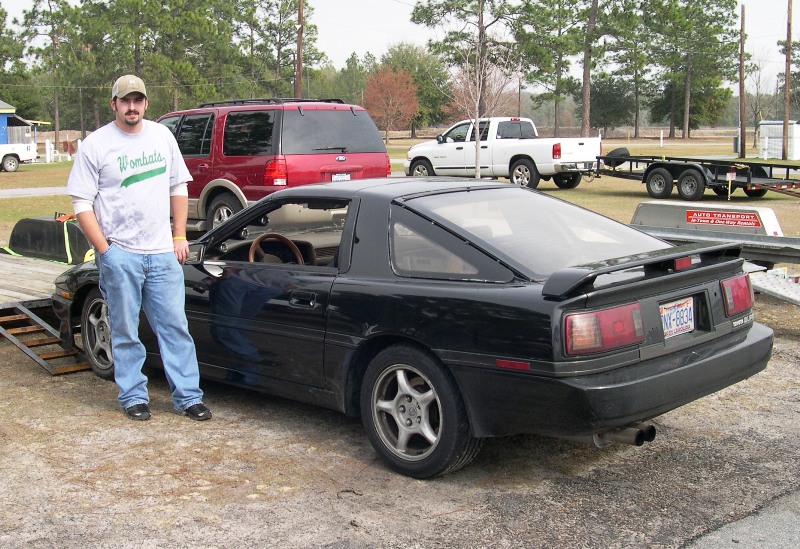
Aaron with his Supra -
the GSM mechanics don't limit their knowledge to
German cars - many have experience with Mazdas, Hondas
and Toyotas.
After lunch, we had a
chance to see what the car could do on a really dry
track. As the session went by, Doc made
significant progress with the computer's fuel mapping.
The car was unstable on hard braking going into turn
one, so with a few clicks on the front shocks, Doc
solved that problem. I was impressed with how
he could figure out the problem and tune in a
solution. Over time, I came to the conclusion that
the car turned pretty well in right hand turns, but
it oversteered in left hand turns. Between
sessions, Doc would make shock absorber adjustments
trying to account for this, but they had only
minimal affect. I finally decided we need to
put the car on scales, so we could determine if it
was properly corner balanced - and that's when we
found the potential source of our problem.
If a car is perfectly
balanced, each corner of the car carries exactly 1/4 of the car's weight. In the
real world, this is impossible to achieve, but what
you can do to make a car handle well, is make the
cross weights match each other. In other
words, you can adjust the car such that:
(Right Front) + (Left
Rear) = (Left Front) + (Right Rear)
You do this by making adjustments on the springs that support each
corner the car. When you do this "corner balancing", the
car will handle equally well in left and right hand
turns. Don't ask me why this works - only braniacs like Doc fully understand it.
So we put the car on these 4 specially designed
scales that I have, and find that our cross weights
do not match. Our (RF + LR) weight is well
over 100lbs more than our (LF + RR) weight.
This is why the car oversteers in left hand turns.
We don't have time to fix this now, but we'll have
to do something to correct that between now and
Daytona (which is only 3 days away).
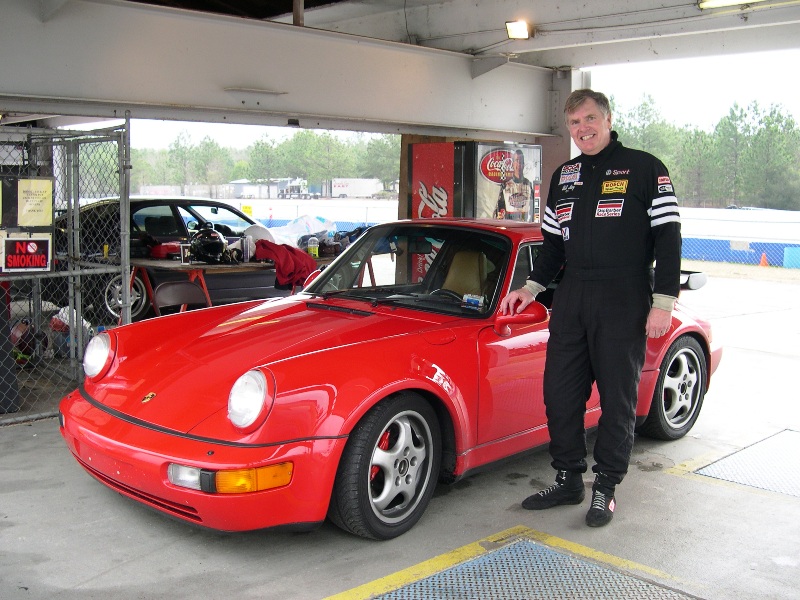
Racer and GSM customer,
Bill May, posing next to his very fast Porsche 911
street car with its high performance Euro motor.
He purchased it recently, and Roebling was its
maiden track test - a very quick driver in a very
quick car.
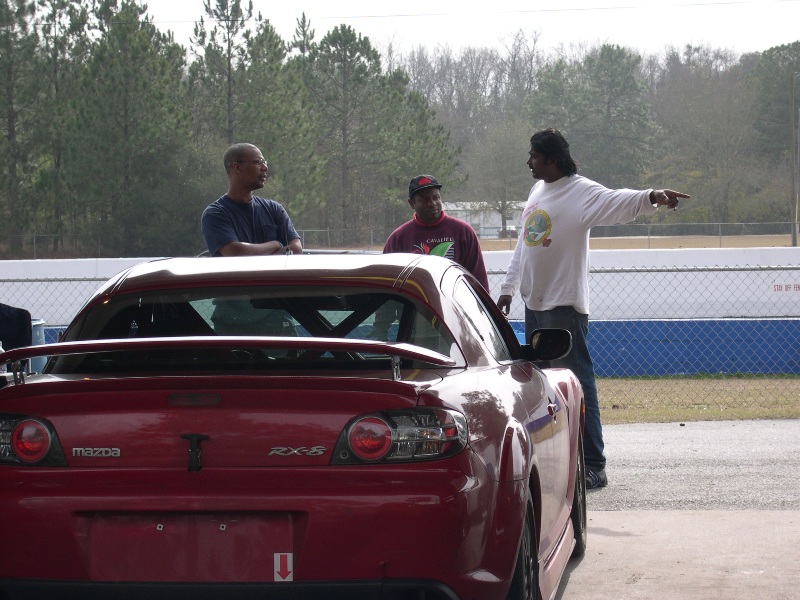
As 3:00pm rolls around,
more storm clouds start to approach. At least
we had a couple of hours of dry track, which allowed
me to get familiar with driving the RX-8. We
had hoped that Danny would be able to fly down
during the day to join us, but he couldn't get away
from his rather pressing and important business.
Doc made some significant progress on the
programming of the engine management computer, so it
became more drive-able at part throttle, but there
is a bit more work to do. This is not uncommon
when programming the engine in a race car from
scratch. So for Daytona we'll have more power
when under full throttle than we had at practice a
few weeks ago, at the expense of drive-ability at
partial throttle. I don't know yet how
this will affect us, but given that Daytona (unlike
Roebling) is mostly a full throttle track, we think
it will be a significant net gain.
Right before the rain
starts, we put on a fresh set of Hoosiers, the plan
being I will scrub them in to use for the race at
Daytona. I go out on track and immediately
drive 2.5 seconds faster on the new tires.
Wow, what a difference that makes! After 3-4
laps, I pit - any more would be unnecessary since we are
saving these tires for the race. As I pull
into the pits, the rain returns to Roebling - now
that was perfect timing!
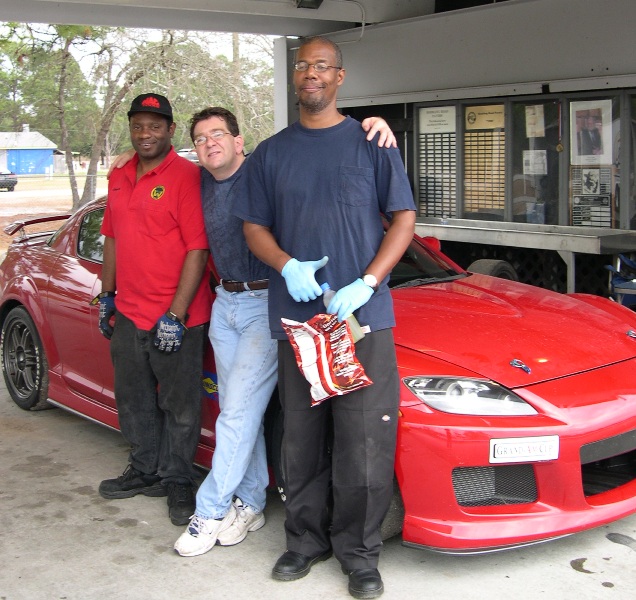
A thumbs up from Doc, as
the three amigos prepare to call it a day. Doc
was pleased with the progress we were able to make
today. Tomorrow Doc will get the new decal
scheme applied to the car, and clean up a few loose
ends. Its going to be a busy day for Lenworth
and him. I plan
to get up at o'dark-thirty
on Wednesday morning, and drive down to Daytona so
that I can get there by 2:00pm (or sooner, if
traffic is light). Hopefully the car will be
unloaded off the ROAR transporter by then, and I'll
have until 5:00pm to get it "corner balanced".
It's something I've done before with my own race
cars, so I'm hoping it won't be too difficult. Knock on wood...
Thursday is practice
and qualifying. Friday we race. Saturday
and Sunday we celebrate our success and mingle with
the
spectators at the 24 hours of Daytona. Stay
tuned for the next installment! |

